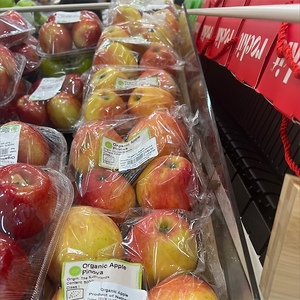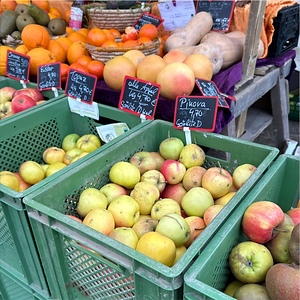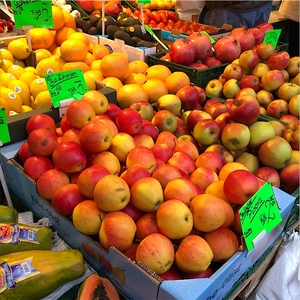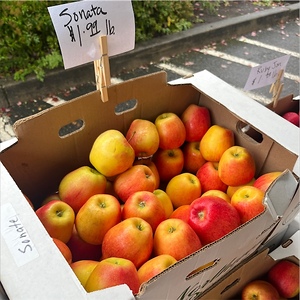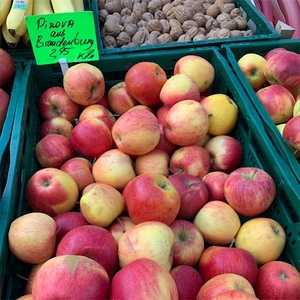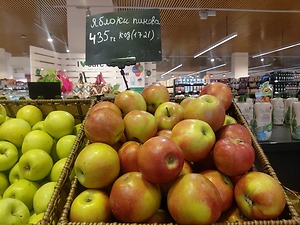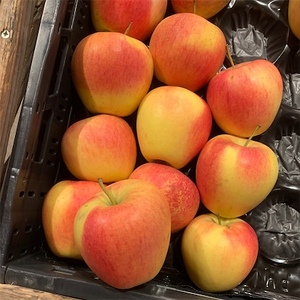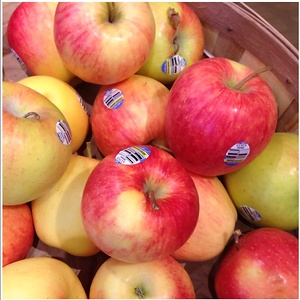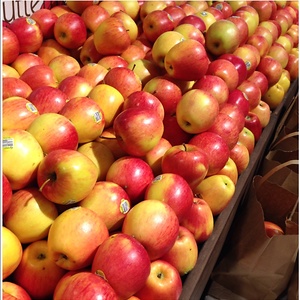

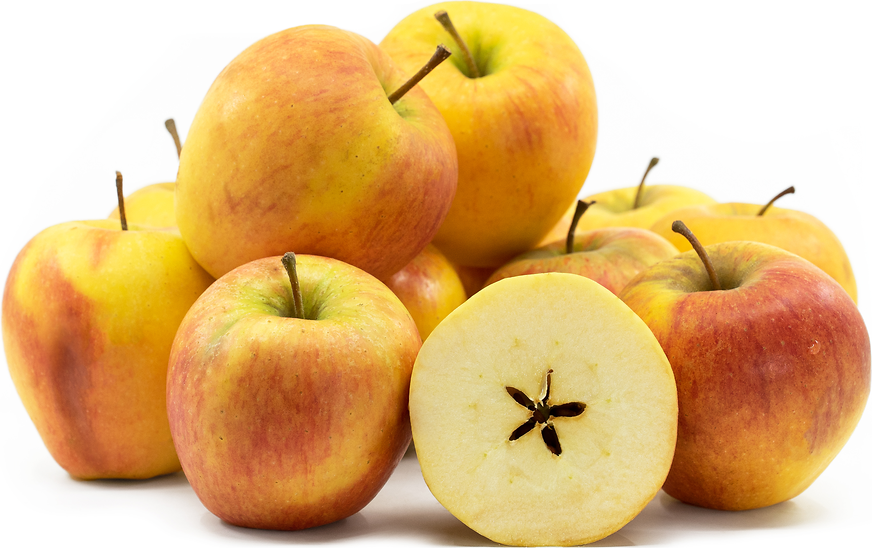
Pinova Apples
Estimated Inventory, lb : 0
Description/Taste
Pinova apples are a small to medium-sized varietal, averaging 7 to 10 centimeters in diameter, and have a round to conical appearance with flat, broad shoulders and a narrow base. The apples have slender, elongated, and fibrous green-brown stems, and the skin is thin, smooth, and taut, encased in prominent, light yellow lenticels. The surface also showcases a yellow-green base hue, almost entirely covered in dark red and orange blush and striping. Underneath the surface, the white flesh is fine-grained, aqueous, and semi-firm with a crisp consistency. The flesh also contains a central core filled with tiny black-brown seeds. Pinova apples have a sweet, fruity, and subtly floral aroma. The apples should feel heavy for their size when ripe and will have balanced sugar and acidity levels, creating a sweet-tart flavor with a light, astringent aftertaste. A distinct trait of Pinova apples is their slightly tropical taste. Pinova apples have nuances of pineapple, honey, melon, and banana. The tart and astringent notes will mellow with extended storage, and the flesh will soften, developing a mild, sweet taste.
Seasons/Availability
Pinova apples are available in late fall through early summer.
Current Facts
Pinova apples, botanically classified as Malus domestica, are a German cultivar belonging to the Rosaceae family. The late-season variety was developed in the late 20th century and was selected for its resistance to disease, high yields, and extended storage capabilities. Pinova apples are a commercial cultivar in Europe and are produced on a limited scale in the United States as a specialty fruit. The apples are also favored for home garden planting as the variety is an effective pollinizer for other apple trees. Presently, Pinova apples are an all-purpose cultivar valued by apple enthusiasts for the fruit’s firm, crisp flesh, variegate coloring, and sweet-tart tropical flavor. The apples can be used in a wide array of raw and cooked culinary preparations and are also incorporated into beverages.
Nutritional Value
Pinova apples are a source of fiber to regulate the digestive tract, potassium to balance fluid levels within the body, calcium to protect bones and teeth, and antioxidants to reduce inflammation while protecting the cells against free radical damage. The apples also provide vitamin C to strengthen the immune system and reduce inflammation, vitamin A to maintain healthy organ functioning, and other nutrients, including iron, vitamin E, vitamin K, magnesium, boron, copper, and zinc.
Applications
Pinova apples have a sweet-tart, subtly tropical flavor well suited for fresh and cooked preparations. The apple has thin skin and is slow to brown, allowing it to be consumed straight, out of hand, chopped into green and fruit salads, sliced into grain bowls, or displayed on charcuterie boards, served with meats, cheeses, nuts, and dried fruits. Pinova apples can also be blended into smoothies, pressed into juice for carbonated beverages, or stirred into cocktails. In addition to fresh preparations, Pinova apples hold their shape well when cooked, making them a popular selection for desserts and baked goods. The apples can be incorporated into pies, crisps, tarts, cakes, and dumplings or baked into muffins, bread, and cookies. Pinova apples can also be poached, sauteed in brown sugar and butter, or hollowed, stuffed, and baked as a savory-sweet dessert. Beyond sweet dishes, Pinova apples complement savory preparations, cooked with pork, minced into side dishes with root vegetables, layered onto sandwiches, or chopped into stuffing. The apples can also be dried into rings as a chewy snack. Pinova apples pair well with spices such as cinnamon, nutmeg, allspice, ginger, and cloves, brown sugar, maple syrup, vanilla, nuts including hazelnuts, pecans, and walnuts, carrots, other root vegetables, dates, and fruits such as coconut, citrus, pomegranates, and pineapple. Whole, unwashed Pinova apples will keep up to six months in professional cold storage, but consuming the fruits within two months for the best quality and flavor is recommended. The apple’s flavor will develop a mellower taste with storage, but the flesh can sometimes soften when stored for too long. Pinova apples should be kept in the refrigerator’s crisper drawer.
Ethnic/Cultural Info
Pinova apples are known by several names worldwide, including Piñata, Sonata, and Corail. Piñata is a festive moniker developed from a combination of the names Pinova and Sonata. The Mathisons family, owners of Stemilt Growers in Washington, first encountered Pinova apples in the news as the variety was becoming popular throughout European markets. The Mathisons planted a few trees in their orchards in Central Washington, and after years of trials, evaluations, and testing, they purchased the rights to grow and market the variety in 2004. Stemilt has exclusive control of the production, sale, and branding of Pinova apples in North America, and with their introduction of the European apple to American markets, they rebranded the cultivar under the name Piñata. Stemilt Growers promotes Piñata apples as their signature variety, and the apples are still grown in Central Washington, where the nutrient-dense volcanic soil, warm climate, and ample sunshine contribute to the fruit’s sweet-tart fruity flavor. In the United States, Piñata apples are marketed during the Christmas season as a flavorful and festive variety.
Geography/History
Pinova apples were developed at the Fruit Research Institute in Dresden-Pillnitz, eastern Germany. The apple was bred by Johann Schmadlak, Christa Fischer, Heinz Murawski, and Manfred Fischer in the mid 20th century and was created from natural crosses between golden delicious and clivia apples, a variety stemming from cox’s orange pippin and oldenburg. The cultivar was studied and trialed for over 18 years before being released to commercial markets in Europe. Pinova apples became widely cultivated after their market introduction, and the variety even received a Protected Geographical Indication, PGI, in the Ventosa Valley in Italy. In 2004, Pinova apples were brought to the United States and released the apples under the name Piñata. Stemilt Growers has exclusive rights to Pinova apples in the United States and controls the growth, marketing, and sale of Pinova apples. Today Pinova apples are cultivated in North America, Europe, Australia, New Zealand, South Africa, and South America.
Recipe Ideas
Recipes that include Pinova Apples. One
| Val Venosta |
|
Pizza with Pinova Apples, Provola Cheese and Rosemary |
| South Tyrolean Apple |
|
Choux Ring with Caramel Apples |



